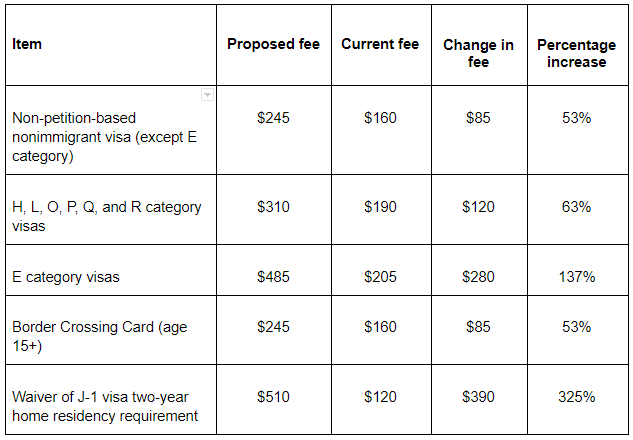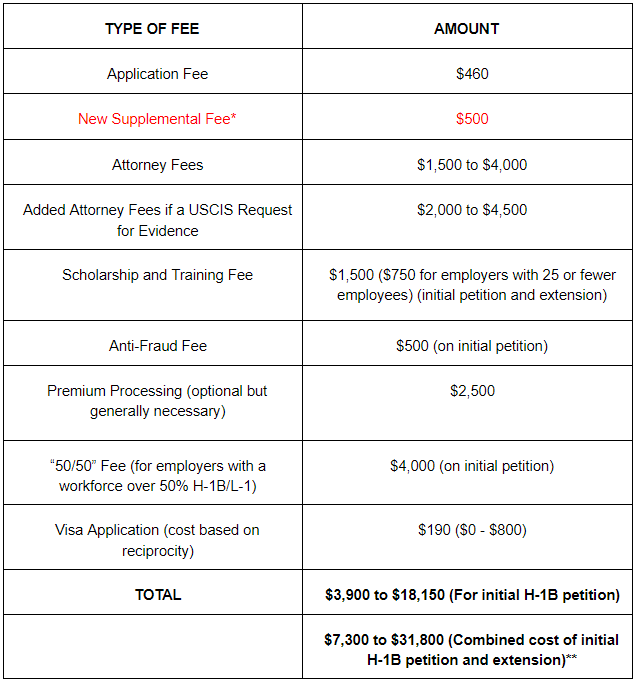As the new year begins, another obstacle for prospective international students, particularly those looking to study in the United States, is also about to arise. The U.S. Department of State has issued a proposed rule that would raise nonimmigrant visa fees to more closely align the payments with the government’s cost of delivering these services.
In this post, I will describe the proposed visa fee increases and examine their ramifications for the international education scene in the United States.
Key Takeaways
The fee for applying for a US visa for international students is set to rise by 53%.
Filing an H-1B visa petition in the United States will also become more expensive with the proposed $500 supplemental fee.
The proposed visa fee increases are seen as detrimental and would dissuade international students from applying.
One unintended consequence is that high visa processing expenses may also encourage international students to study in other countries.
According to a Federal Register notice released on December 29, 2021, the State Department has proposed to increase fees for employees, travelers, international students, and exchange visitors in 2022. If the rule is implemented, visa fees will rise as follows:
- The visa fee will increase from $160 to $245 per application for “business and tourist travel (B1/B2); students and exchange visitors (F, M, and J); crew and transit visas (C and D); representatives of foreign media (I), and other country-specific visa classes, as well as BCCs [Border Crossing Cards] for applicants age 15 and older who are Mexican citizens and residents.”
- The visa fee for “all petition-based NIVs [nonimmigrant visas] related to employment in the United States” will rise from $190 to $310. This includes “temporary workers and trainees (H); intracompany transferees (L); aliens of extraordinary ability (O); athletes, artists, and entertainers (P); international cultural exchange participants (Q); and religious workers (R).”
- The Department also recommends raising the E category NIV fee from $205 to $485.
- The State Department suggests increasing the cost of a waiver of the two-year home-country physical presence requirement for J-1 exchange visitors who are “subject to a two-year home-country physical presence requirement” from $120 to $510.
TABLE 1. INCREASES IN STATE DEPARTMENT FEES FOR SOME CONSULAR VISA SERVICES

To set fees, the Department employs a procedure known as a “Cost of Service Model” (CoSM). Fees charged to applicants under this model should be sufficient to pay the government’s cost of processing the application. To meet escalating costs, the Department proposes raising all nonimmigrant fees; however, certain categories and services, such as E visas and J visa home residency waivers, take much more time and effort to complete and thus are projected to experience bigger fee increases.
The department explains that the higher fees are the result of a study of the costs of delivering specific consular services. For visas, the U.S. government uses a “full cost recovery” model, which means that the person getting the commodity or service pays for all direct and indirect costs of supplying it, from personnel wages to biometric services and rent.
According to the Federal Register notification, nonimmigrant visa fees were last modified in 2014. The U.S. government claims that, given the high cost of air travel, the proposed price hikes will have little impact on the overall cost of visiting the United States.
The State Department anticipates that the proposed rule would take effect before September 2022, and it will collect comments on the proposed fee increases through February 28, 2022.
New Increase in H-1B Visa Fee
Filing an H-1B visa petition in the United States will also become more expensive if the House reconciliation plan becomes law. This impending fee increase presents a barrier to organizations that hire highly talented foreign nationals, particularly international students who can significantly contribute knowledge and skills to a company established in the United States.
These employers also sponsor their permanent residency, but it will be difficult for firms to give such a competitive incentive once a $500 extra cost is added to the existing H-1B petition fees.
TABLE 2: APPLICATION AND OTHER H-1B VISA FEES FOR EMPLOYERS

IMPLICATIONS OF VISA FEE INCREASE
Increased visa fees would dissuade international students and scholars from coming to the United States. While international education associations welcome attempts to expedite requests, some believe that the planned hikes are excessive, cumbersome, and would hurt students, visiting faculty, and institutions of higher learning. Overall, visa costs would rise by 53 percent, with little evidence that the increased income collected will be used to reverse the continuing visa processing bottleneck.
On the other hand, the increase in H-1B Fees shows critics are false in their claims that H-1B visa holders are “cheap labor” rather than valuable employees who contribute to the U.S. economy. Although it debunks the cheap labor myth, increasing the fees can adversely impact the ability of companies to hire foreign nationals because of high processing costs.
Henceforth, challenges to getting an H-1B visa inhibits overseas students from working in the United States after graduation, and it does little to address the per-country limit and shortage of green cards, which hurt employment-based immigrants, notably those from India. The prospect of a decades-long wait for permanent residence restricts mobility, hinders entrepreneurship, and encourages skilled individuals to pursue professions in other nations. (MAY ARTHUR)
#PartnerForLife #HigherEducation #StudentRecruitment #InternationalEducation #MSM #StudyVisa #H1B
May is a seasoned international education business executive with over 27 years of experience. She has held several leadership roles dedicated to growing and retaining the international student population at partner universities.
Her broad areas of expertise include business development, organizational leadership, strategic planning, and global operations. She excels at developing and supporting partnerships with universities and managing global recruitment initiatives.
She has also been an active member of several renowned industry organizations including NAFSA: Association of International Educators, English USA, American International Recruitment Council (AIRC), and the Association of International Education Administrators (AIEA).
References:
Anderson, S. (2021, December 10). New increase in H-1B visa fees further shatters ‘Cheap labor’ myth. Forbes. Retrieved January 15, 2022, from https://www.forbes.com/sites/stuartanderson/2021/11/01/new-increase-in-h-1b-visa-fees-further-shatters-cheap-labor-myth/?sh=b9013e85b15d
Anderson, S. (2022, January 5). The outlook on H-1B Visas and immigration in 2022. Forbes. Retrieved January 15, 2022, from https://www.forbes.com/sites/stuartanderson/2022/01/03/the-outlook-on-h-1b-visas-and-immigration-in-2022/?sh=506c02bd2365
Changes to student visas are on the Horizon. Open Campus. (2022, January 3). Retrieved January 15, 2022, from https://www.opencampusmedia.org/2022/01/03/changes-to-student-visas-are-on-the-horizon/
Department of State to raise nonimmigrant visa fees in 2022. Boundless. (2022, January 6). Retrieved January 15, 2022, from https://www.boundless.com/blog/department-of-state-to-raise-niv-fees-2022/
US announces important changes for student Visa Policy. ICEF Monitor – Market intelligence for international student recruitment. (2022, January 12). Retrieved January 15, 2022, from https://monitor.icef.com/2022/01/us-announces-important-changes-for-student-visa-policy/

